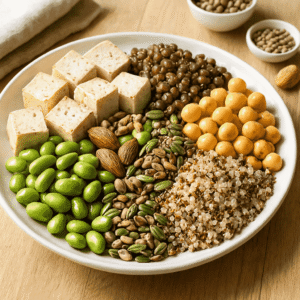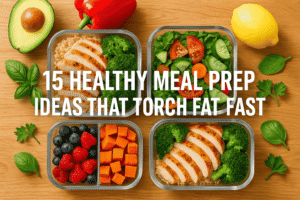High-Intensity Interval Training, or HIIT, has revolutionized the fitness world by providing a fast and effective way to burn fat. Whether you are looking to slim down or maintain a healthy weight, HIIT workouts are among the best exercises to boost metabolism and shed fat. This guide will walk you through the benefits of HIIT, a list of powerful exercises, and sample workout routines that maximize fat burning. Let’s dive in!
What is HIIT and Why is it Effective for Fat Loss?

HIIT (High-Intensity Interval Training) is a form of cardiovascular exercise alternating between intense bursts of activity and short rest periods. Studies show that HIIT workouts burn calories quickly and continue to boost your metabolism hours after you finish exercising. This is known as the “afterburn effect” or EPOC (excess post-exercise oxygen consumption). Since HIIT requires only a few minutes per day, it’s perfect for busy individuals looking to lose fat fast.
For those looking to get started, searching for “HIIT training near me” can help find classes or programs that suit your fitness level, whether you’re a beginner or more advanced.
How HIIT Workouts Help with Fat Loss

HIIT is particularly effective for weight loss due to its ability to increase your heart rate quickly, pushing your body to burn fat efficiently. Here’s why HIIT works:
- Burns Calories Fast: A HIIT session can burn a significant amount of calories in a short time.
- Boosts Metabolism: The afterburn effect keeps your metabolism elevated even after your workout ends.
- Improves Cardiovascular Health: HIIT is excellent for heart health and overall fitness, adding both endurance and strength.
Combined with a balanced diet, HIIT is a powerful way to achieve a calorie deficit, leading to weight loss and better fitness.
Top HIIT Exercises for Effective Fat Burning

Let’s explore some of the best HIIT exercises for burning fat. These exercises can be done at home, in a gym, or even in a park. If you’re looking for guidance, platforms like Peloton offer HIIT workouts you can follow from anywhere.
Classic High-Intensity Exercises
These exercises form the core of any effective HIIT workout:
- Burpees: A full-body exercise combining squats, planks, and jumps. Burpees are great for fat loss and conditioning.
- Jump Squats: These help build leg strength while increasing your heart rate. Squat down and then jump up explosively.
- Mountain Climbers: An intense cardio move targeting your core, shoulders, and legs. Assume a plank position and alternate bringing knees to the chest.
Strength-Focused HIIT Movements

Adding weights to HIIT helps build muscle, which increases fat burn in the long term.
- Kettlebell Swings: Great for targeting the legs, core, and shoulders. Stand with feet shoulder-width apart, holding the kettlebell with both hands and swing it up to shoulder level.
- Dumbbell Thrusters: Combine squats with overhead presses to work on legs, shoulders, and core simultaneously.
Low-Impact HIIT and Alternative Styles

Low-impact HIIT options provide fat-burning benefits without high strain on joints.
- Battle Ropes: If you have access to battle ropes, these are excellent for a full-body cardio workout.
- Cycling Sprints: Use a stationary bike for high-intensity sprints, then slow down for a rest period.
- HIIT Pilates: This combines the control of Pilates with the intensity of HIIT, targeting the core, legs, and glutes while enhancing flexibility.
Online Options: For a more guided experience, consider platforms like Peloton, which offer a variety of HIIT classes that you can follow from home, including cardio, strength, and even HIIT Pilates workouts.
Sample HIIT Workout Routines for Fat Loss

Here are a few HIIT routines for different fitness levels. Each includes a warm-up, high-intensity intervals, and a cool-down.
Beginner Routine (20 Minutes)

- Warm-Up (5 Minutes): Jumping jacks, high knees, and dynamic stretching.
- Intervals (10 Minutes):
- Burpees (30 seconds on, 30 seconds rest)
- Jump Squats (30 seconds on, 30 seconds rest)
- Mountain Climbers (30 seconds on, 30 seconds rest)
- Cool-Down (5 Minutes): Light stretching and breathing exercises.
Advanced Routine (30 Minutes)

- Warm-Up (5 Minutes): Jump rope, dynamic lunges, and arm circles.
- Intervals (20 Minutes):
- Kettlebell Swings (40 seconds on, 20 seconds rest)
- Dumbbell Thrusters (40 seconds on, 20 seconds rest)
- Battle Ropes (40 seconds on, 20 seconds rest)
- Cycling Sprints (40 seconds on, 20 seconds rest)
- Cool-Down (5 Minutes): Stretching and foam rolling for muscle recovery.
Low-Impact Routine (15 Minutes)

- Warm-Up (5 Minutes): Light jog or march in place.
- Intervals (10 Minutes):
- HIIT Pilates moves (like Pilates squats and leg lifts) with 30 seconds on, 30 seconds off
- Seated cycling sprints (30 seconds on, 30 seconds off)
- Cool-Down (5 Minutes): Gentle stretching and deep breathing.
Feel free to adjust the intervals based on your fitness level. For beginners, shorter intervals (e.g., 20 seconds) and longer rest (e.g., 40 seconds) can help ease into HIIT without overexertion.
Tips to Maximize Results from HIIT Workouts

Here are some simple tips to get the most out of your HIIT workouts:
- Be Consistent: Regular HIIT training is key to seeing results. Try to work out three times a week to start.
- Pair with a Healthy Diet: Proper nutrition is essential for weight loss. Aim for a balanced diet rich in protein, fiber, and healthy fats.
- Track Your Progress: Measure your fitness progress by tracking changes in weight, inches lost, and improvements in endurance. This keeps you motivated and shows results.
FAQs about HIIT Workouts for Fat Loss

Q1: Can HIIT workouts be done every day?
HIIT workouts are intense, and it’s recommended to do them 3–4 times a week to allow time for recovery.
Q2: What should I eat before and after a HIIT workout?
Before your workout, eat a light snack with carbs for energy (e.g., a banana). After your workout, focus on protein (like a smoothie or lean meat) to support muscle recovery.
Q3: Can beginners try HIIT?
Absolutely! Start with shorter intervals and low-impact exercises like HIIT Pilates or modified squats and lunges.
Q4: How long should a HIIT session last?
HIIT sessions can range from 15 to 30 minutes. The key is to go hard during your active intervals and keep sessions short to avoid burnout.
Q5: Does HIIT help with muscle gain as well as fat loss?
Yes, strength-based HIIT exercises (e.g., kettlebell swings, and dumbbell thrusters) can help build muscle while burning fat, leading to a toned physique.
Q6: Is it possible to do HIIT at home?
Definitely! Bodyweight exercises like burpees, mountain climbers, and jump squats are ideal for home workouts. Platforms like Peloton also offer HIIT classes you can follow from home.
HIIT workouts are a fantastic way to burn fat and improve fitness, whether you’re a beginner or a seasoned athlete. With a variety of exercises to choose from and options to try in a gym or at home, you’re sure to find a HIIT routine that fits your lifestyle. Remember to stay consistent, track your progress, and enjoy the journey to a healthier you!





Comments are closed.